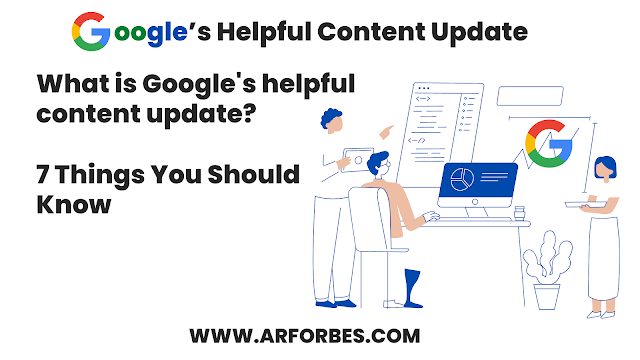7 Things You Should Know about Google’s Helpful Content Update will roll out starting on August 25 and last for up to two weeks Tody we answer about what is Google’s Helpful Content Update
.
Google started implementing its helpful content algorithm change today, which encourages material that puts people first and devalues content created for search engines.
Google confirmed the August 25 deployment of the helpful content update on its website for search rankings updates.
Google announced the update’s impending arrival last week and offered many tools to assess if your content meets the criteria for “people-first.”
I’ll try to add more context to Google’s suggestion in an effort to make it even more useful in the spirit of today’s release.
Here are seven things you should be aware of to make sure you’re producing content that puts people first in accordance with Google’s recommendations.
What is Google’s helpful content update?
The new helpful content upgrade that Google pre-announced last week has already begun to go out. Reminder: The Google update to its informative material counts as a site-wide signal. It targets websites with a disproportionately large volume of unsatisfactory or useless material that is produced with search engines in mind first.
What is content updating?
Content Update denotes a revision of any periodically required content revisions for the Licensed Software. If the licensed software updates an earlier version, the licensee has to have a current license for the earlier version.
What is the latest Google algorithm update in 2022?
The wide core algorithm was updated for the first time in 2022 and in more than six months. The whole rollout might take up to two weeks, according to Google. Like all previous core upgrades, Google has made significant adjustments to the way its ranking algorithms evaluate material.
7 Things You Should Know about Google’s Helpful Content Update
1. Keep your discussion on your main subject.
Do you have a target market for your company or website that would be interested in the material if they visited you directly?
Google may be attempting to encourage users to focus on their areas of expertise with this suggestion.
Publishing articles outside of your niche might occasionally be considered creating material for search engines.
Imagine you run a recipe website and spot a chance to profit from a popular skin care term.
The content could be useful, but the site’s regular visitors who come looking for recipes are unlikely to find it useful.
Google also advises considering the following associated questions:
- Is the information primarily intended for search engine users as opposed to being created with humans in mind?
- Are you blogging about topics only because they appear to be trendy rather than because you would normally write about them for your current audience?
- Did you choose to write on a specialized subject for which you had no true knowledge primarily in the hope of attracting search traffic?
2. Do Present Personal Experience
Does your material genuinely show first-hand experience and depth of knowledge (for instance, experience resulting from having actually used a product or service or been somewhere)?
Are you primarily summarizing other people’s arguments without really contributing anything?
3. Avoid Consolidating Different Subjects into One Website
“Does your site have a single goal or focus?”
4. Do Respond to Questions from Searchers with Enough Information
“Will someone leave feeling they’ve learnt enough about a topic to assist them reach their objective after reading your content?”
Google also advises posing the following relevant queries to yourself:
- Do readers who read your material feel like they need to re-search to find more accurate information from other sources?
- You may have heard or read that Google has a preferred word count, therefore are you writing to that particular word count? The answer is “no,”
5. Pay Attention to the Complete Reader Experience
Will someone who reads your material come away from it with a positive experience?
6. Avoid answering questions with unconfirmed answers.
Does your material claim to provide a response to a query that is truly unanswered, for as by implying that a product, movie, or TV program would have a release date when none has been set forth?
7. Do Follow Google’s Recommendations for Other Significant Updates
“Are you following our recommendations for product evaluations and core updates?
Google wants to remind you that the same advice that applies to the helpful content update also applies to the core upgrades and the product review update.
It’s likely that you’ll benefit from the helpful content update if you already adhere to Google’s recommendations for core upgrades and product review pages.
Final Remarks
Over the following two weeks, Google’s helpful content upgrade will gradually roll out. It’s advisable to hold off on evaluating the impact until the upgrade is finished.
The change impacts English searches everywhere and will eventually include additional languages.
Google will make further helpful material updates in the future. In its first release, Google makes it clear that it “will constantly improve its attempts to recognize problematic content:”
© copyright 2019 – all rights are saved










